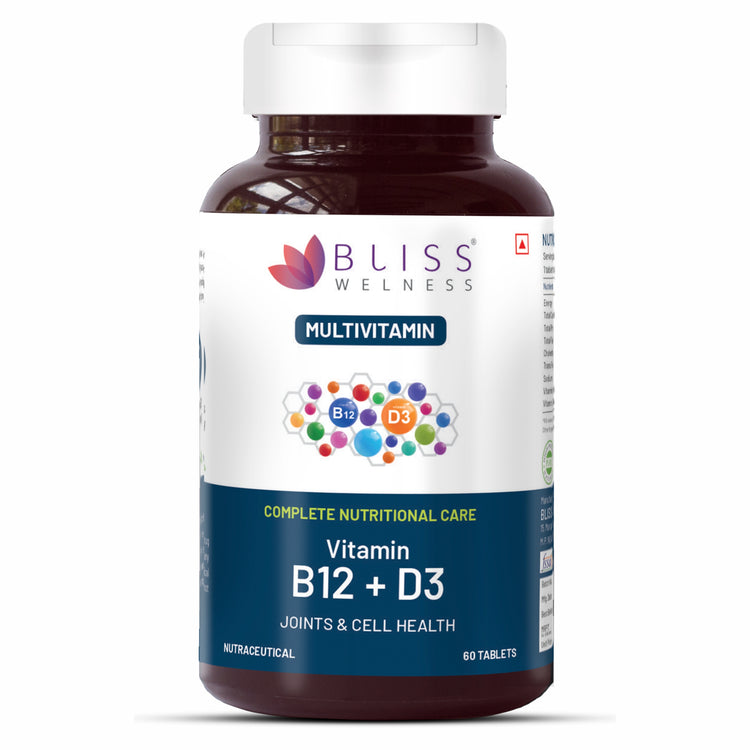In today's fast-paced world, women juggle multiple responsibilities, often neglecting their nutritional needs. Among the essential vitamins crucial for overall well-being, Vitamin B12 and Vitamin D3 stand out due to their significant impact on energy levels, bone health, cognitive function, and immunity. Unfortunately, deficiencies in these vital nutrients are widespread among women, leading to various health issues. This blog explores the symptoms, causes, detection methods, treatment options, and prevention strategies specifically for women.
Symptoms of Vitamin B12 and D3 Deficiency

|
Symptom |
Vitamin B12 Deficiency |
Vitamin D Deficiency |
|
Fatigue and Weakness |
Persistent tiredness and lack of energy, even after rest. |
Fatigue, tiredness, and low energy levels. |
|
Pale Skin |
Unusual paleness due to reduced red blood cell production. |
(Less common). |
|
Neurological Issues |
Numbness, tingling, or burning sensations in hands and feet; difficulty with balance and coordination. |
Tingling sensation in hands and feet. |
|
Cognitive Problems |
Memory loss, difficulty concentrating, confusion, and impaired judgment. |
Brain fog, difficulty concentrating. |
|
Mood Changes |
Depression, irritability, anxiety, and mood swings. |
Mood changes, such as depression and anxiety. |
|
Glossitis/Mouth Ulcers |
A swollen, inflamed tongue that appears smooth and red; sores or ulcers inside the mouth. |
(Uncommon). |
|
Heart Palpitations |
Irregular or rapid heartbeat due to anemia. |
Heart palpitations. |
|
Dizziness/Balance Issues |
Feelings of dizziness or lightheadedness; impaired coordination can increase fall risk. |
Dizziness, vertigo. |
|
Vision Problems |
Blurry or double vision as a result of nerve damage. |
(Uncommon). |
|
Bone/Joint Pain |
(Indirectly related). |
Bone pain, muscle pain, joint pain, and increased sensitivity to pain. |
|
Muscle Weakness/Aches/Cramps |
(Indirectly related). |
Muscle weakness, aches, cramps, and muscle spasms. |
|
Frequent Infections |
N/A |
Increased susceptibility to infections. |
|
Bone Loss/Fractures |
N/A |
Bone loss and increased risk of fractures. |
How to Detect Vitamin B12 and D3 Deficiency
Vitamin B12 Deficiency Diagnosis
A simple blood test can detect Vitamin B12 deficiency. Doctors may check:
- Hemoglobin & Red Blood Cell Size: To assess anemia.
- Serum Vitamin B12 Levels: To determine total B12 in the blood.
- Folate Levels: Since folate deficiency can mimic B12 deficiency symptoms.
- Homocysteine Levels: High levels indicate potential B12 deficiency.
Vitamin D3 Deficiency Diagnosis
A 25-hydroxyvitamin D blood test is the gold standard for diagnosing Vitamin D3 deficiency. Levels below 20 ng/mL indicate deficiency, while optimal levels range between 30-50 ng/mL.
Long-Term Risks of Untreated Vitamin B12 and D3 Deficiency in Women
Risks of Vitamin B12 Deficiency
- Neurological Damage: Permanent nerve damage, memory issues, and difficulty walking.
- Anemia & Chronic Fatigue: Low energy due to impaired red blood cell production.
- Heart Disease Risk: Increased homocysteine levels can contribute to cardiovascular problems.
- Reproductive & Pregnancy Complications: Increased risk of infertility, miscarriage, and birth defects.
- Osteoporosis: Weakening of bones,
- making them more prone to fractures.

Risks of Vitamin D3 Deficiency
- Bone Disorders: Increased risk of osteoporosis, fractures, and bone softening (osteomalacia, rickets).
- Autoimmune Diseases: Higher susceptibility to conditions like rheumatoid arthritis and multiple sclerosis.
- Hormonal Imbalance: Linked to irregular menstrual cycles, PCOS, and reduced fertility.
- Depression & Chronic Fatigue: Persistent mood swings and low energy levels.

How to Treat Vitamin B12 and D3 Deficiency
Vitamin B12 Deficiency Treatment
- B12 Injections: Recommended for severe deficiencies, especially in women with absorption issues like pernicious anemia.
- Sublingual B12 Supplements: Methylcobalamin is the preferred form for better absorption.
- B12-Rich Diet: Include animal-based sources like eggs, dairy, meat, and fish. Vegans can opt for fortified cereals, plant-based milk, and nutritional yeast.
Vitamin D3 Deficiency Treatment
- High-Dose Supplements: Depending on the severity, doctors may recommend weekly or daily Vitamin D3 supplementation.
- Sunlight Exposure: 15-30 minutes of sun exposure at least three times a week helps boost D3 levels naturally.
- Dietary Sources: Include fatty fish (salmon, mackerel), egg yolks, mushrooms, and fortified dairy products.
Who is at Risk of Vitamin B12 & D3 Deficiency?
- Pregnant & Breastfeeding Women: Increased demand for nutrients.
- Vegans & Vegetarians: Limited B12 sources in plant-based diets.
- Women Over 40: Reduced absorption due to aging.
- Women with Digestive Issues: Conditions like celiac or Crohn’s disease impair nutrient absorption.
- Limited Sun Exposure: Those who wear sunscreen frequently or stay indoors are at higher risk of Vitamin D3 deficiency.
Preventing Vitamin B12 Deficiency
- Eat a Balanced Diet: Include B12-rich foods like poultry, eggs, dairy, and seafood.
- Take Supplements if Needed: Especially for vegans, vegetarians, and women over 40.
- Monitor Alcohol Consumption: Excessive drinking can affect absorption.
- Address Gut Health Issues: Conditions like H. pylori infection or IBS can hinder B12 absorption.
- Regular Blood Tests: Keep track of B12 levels to prevent deficiency.
Preventing Vitamin D3 Deficiency
- Get Enough Sunlight: Spend time outdoors to boost natural Vitamin D production.
- Eat Vitamin D-Rich Foods: Include fortified dairy, fatty fish, and egg yolks in your diet.
- Take Supplements if Needed: Especially during winter months or if you have limited sun exposure.
- Strength Training & Exercise: Weight-bearing exercises help maintain bone density.
Self-Care Strategies for Women’s Health
- Routine Blood Tests: Stay proactive in monitoring your vitamin levels.
- Follow a Balanced Diet: Include essential nutrients in your daily meals.
- Probiotics for Gut Health: A healthy gut aids better absorption of vitamins.
- Exercise & Healthy Lifestyle: Regular movement supports bone, muscle, and immune health.
Final Thoughts
Ensuring adequate intake of Vitamin B12 and D3 is essential for women’s overall well-being. Recognizing deficiency symptoms early and taking preventive steps can protect long-term health, energy, and vitality.
For a reliable source of these essential nutrients, check out Bliss Welness VitaBliss Vitamin B12 & D3 supplements—specially formulated to support women’s energy, immunity, bone health, and cognitive function.
Learn more at www.blisswelness.com and take charge of your health today!
FAQs
1. What is Vitamin B12 good for?
Vitamin B12 helps with nerve function, red blood cell formation, energy production, and brain health. A deficiency can lead to fatigue, weakness, and neurological issues.
2. What does Vitamin D3 do for the body?
Vitamin D3 supports bone health, immune function, and calcium absorption. It also plays a role in mood regulation and reducing inflammation.
3. What are the symptoms of Vitamin B12 deficiency?
Common signs include fatigue, dizziness, numbness or tingling in the hands and feet, pale skin, memory problems, and weakness.
4. What are the symptoms of Vitamin D3 deficiency?
Symptoms include bone pain, muscle weakness, frequent colds, low energy, and mood disorders like depression and anxiety.
5. How do I know if I have a Vitamin B12 or D3 deficiency?
A simple blood test can measure your Vitamin B12 and D3 levels. If you experience fatigue, weakness, or frequent illnesses, it’s best to get tested.
6. How can I increase my Vitamin B12 levels naturally?
Eat more B12-rich foods like meat, eggs, dairy, and fish. Vegetarians and vegans can opt for B12-fortified foods or supplements.
7. How can I boost my Vitamin D3 levels quickly?
Get at least 10–30 minutes of direct sunlight daily, eat foods rich in Vitamin D3 (like salmon, eggs, and fortified dairy), and consider a high-quality supplement if needed.
8. What happens if you take too much Vitamin B12?
Vitamin B12 is water-soluble, meaning excess amounts are usually excreted. However, high doses may cause mild side effects like nausea, dizziness, or headaches.
9. Can low Vitamin D3 cause weight gain?
Yes, Vitamin D3 deficiency has been linked to weight gain, increased belly fat, and metabolic issues due to its role in regulating hormones and inflammation.
10. What is the best time to take Vitamin B12 and D3 supplements?
Take Vitamin B12 in the morning to support energy levels. Vitamin D3 is best taken with a meal that contains healthy fats for better absorption.






